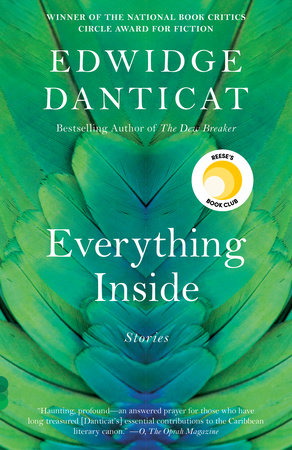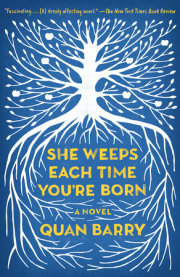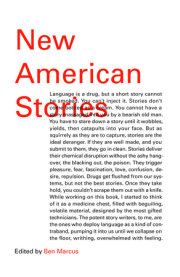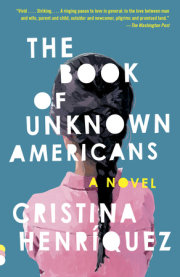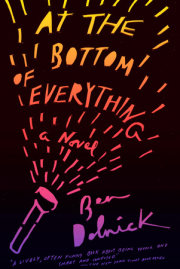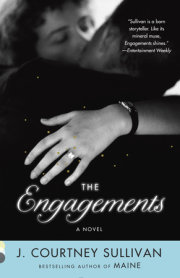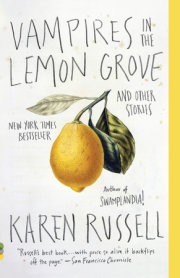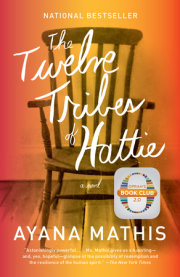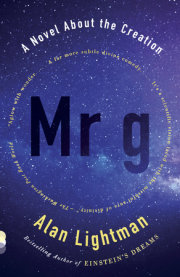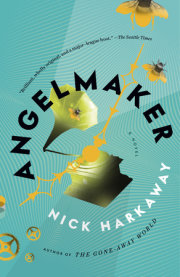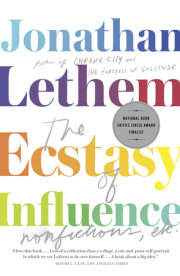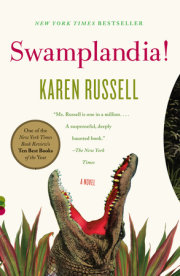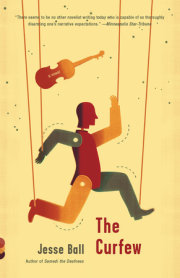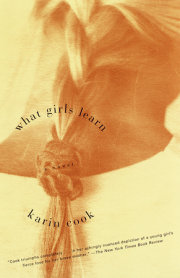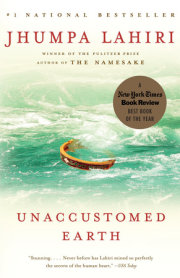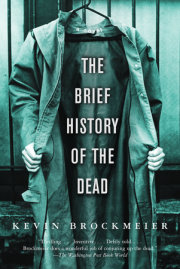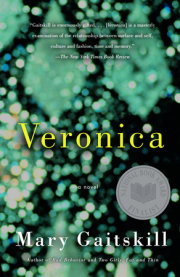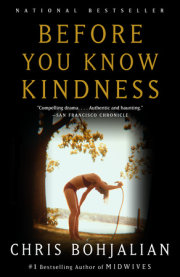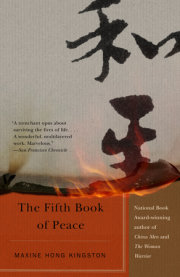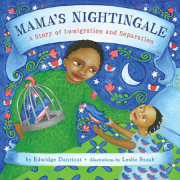Dosas
Elsie was with Gaspard, her live-in renal-failure patient, when her ex-husband called to inform her that his girlfriend, Olivia, had been kidnapped in Port-au-Prince. Elsie had just fed Gaspard some cabbage soup when her cell phone rang. Gaspard was lying in bed, his head carefully propped on two pillows, his bloated and pitted face angled toward the bedroom skylight, which allowed him a slanted view of a giant coconut palm that for years had been leaning over the lakeside house in Gaspard’s single-family development.
Elsie pressed the phone between her left ear and shoulder and used her right hand to wipe a lingering piece of cabbage from Gaspard’s chin. Waving both hands as though conducting an orchestra, Gaspard signaled to her not to leave the room while motioning for her to carry on with her conversation. Turning her attention from Gaspard to the phone, Elsie moved it closer to her lips and asked, “Ki lè?”
“This morning.” Sounding hoarse and exhausted, Blaise, the ex-husband, jumbled his words. His usual singsong tone, which Elsie attributed to his actually being a singer, was gone. It was replaced by a nearly inaudible whisper. “She was leaving her mother’s house,” he continued. “Two men grabbed her, pushed her into a car, and drove off.”
Elsie could imagine Blaise sitting, or standing, just as she was, with his cell phone trapped between his long neck and narrow shoulders, while he used his hands to pick at his fingernails. Clean fingernails were one of his many obsessions. Dirty fingers drove him crazy, she’d reasoned, because, having trained as a mechanic in Haiti, he barely missed having his slender guitar-playing fingers being dirty all his life.
“You didn’t go to Haiti with her?” Elsie asked.
“You’re right,” he answered, drawing what Elsie heard as an endless breath. “I should have been with her.”
Elsie’s patient’s eyes wandered down from the ceiling, where the blooming palm had sprinkled the skylight glass with a handful of brown seeds. Gaspard had been pretending not to hear, but was now looking directly at her. Restlessly shifting his weight from one side of the bed to the next, he paused now and then to catch his breath.
Gaspard had turned sixty-five that day and before his lunch had requested a bottle of Champagne from his daughter— Champagne that he shouldn’t be having, but for which he’d pleaded so much that his daughter had given in, on the condition that he would only take a few sips. The daughter, Mona, who was a decade younger than Elsie’s thirty-six years, had come from New York to visit her father in Miami Lakes. She’d gone out to procure the Champagne and now she was back.
“Elsie, I need you to hang up,” Mona said as she walked into the room and laid out three crystal Champagne flutes on a folding table by the bed.
“Call me soon,” Elsie told Blaise.
After she hung up, Elsie moved closer to the sick man’s spindly daughter. They were about the same height and size, but Elsie felt that she could be Mona’s mother. This was perhaps due to her many years of taking care of others. She was a nurse’s assistant, though no nurse was present on this particular job. She was there to keep Gaspard safe and comfortable, recording vital signs, feeding and grooming him, doing some light housework, and overall keeping him company between his twice-weekly dialysis sessions, until he decided whether or not he would accept his daughter’s offer of one of her kidneys. Mona had been approved as a donor, but Gaspard had still not made up his mind.
Mona poured the Champagne, and Elsie watched her closely as she handed a Champagne flute to her father.
“À la vie,” Mona said, toasting her father. “To life.”
That afternoon, Blaise called back to tell Elsie that Olivia’s mother had heard from the kidnappers. The mother had asked to speak to Olivia, but her captors refused to put her on the phone.
“They want fifty thousand.” Blaise spoke in such a rapid nasal voice that Elsie had to ask him to repeat the figure.
“American?” she asked, just to be sure.
She imagined him nodding his egg-shaped head up and down as he answered “Wi.”
“Of course, her mother doesn’t have it,” Blaise said. “These are not rich people. Everyone says we should negotiate. Can maybe get it down to ten. I’m trying to borrow it.”
She wished he meant ten dollars, which would have made things easier. Ten dollars and her old friend and rival would be free. Her ex-husband would stop calling her at work. But, of course, he meant ten thousand American dollars.
“Jesus, Marie, Joseph,” Elsie mumbled a brief prayer under her breath. “I’m sorry,” she told Blaise.
“This is hell.” He sounded too calm now. She wasn’t surprised by this. Blaise was always subdued by worry. Weeks after he left the konpa band he’d founded and had been the lead singer of, he did nothing but stay home and play his guitar. Then, too, he had been exceedingly calm.
Elsie’s former friend Olivia could be appealing. Chestnut colored, with a bushy head of hair that she wore in a gelled bun, Olivia was sort of nice looking. But what Elsie had first noticed about her was her ambition. Olivia was two years younger than Elsie and a lot more outgoing. She liked to touch people either on the arm, back, or shoulder while talking to them, whether they were patients, doctors, nurses, or other nurse’s aides. No one seemed to mind. Her touch quickly became not just anticipated or welcomed but yearned for. Olivia was one of the most popular certified nurse’s assistants at their North Miami agency. Because of her near-perfect mastery of textbook English, she was often assigned the richest and easiest patients.
Elsie and Olivia met at a one-week refresher course for home attendants, and upon completion of the course they had gravitated toward each other. Whenever possible, they’d asked their agency to assign them the same small group homes, where they cared mostly for bedridden elderly patients. At night when their wards were well medicated and asleep, they’d stay up and gossip in hushed tones, judging and condemning their patients’ children and grandchildren, whose images were framed near bottles of medicine on bedside tables but whose voices they rarely heard on the phone and whose faces they hardly ever saw in person.
The next morning, Elsie helped Gaspard change out of his pajamas into the gray sweats he wore during the day. Elsie wished he would let her help him attempt a walk around the manicured grounds of his development or even let her take him for a ride in his wheelchair, but he much preferred to stay at home, in bed. Just as he had every morning for the last few days, he whispered, “Elsie, my flower, I think I’m at the end.”
Compared with some mornings, when Gaspard would stop to rest even while gargling, he was relatively stable. His face was swelling up, though, blending his features in a way that made his head look like a baby’s.
“Where’s Nana?” he asked, using his nickname for his daughter.
Mona was sleeping in her old bedroom, whose walls were covered with posters of no-longer-popular, or long-dead, singers and actors. Elsie knew little about her except that she was living in New York, where she worked for a beauty company, designing labels for soaps, skin creams, and lotions that filled every shelf of every cabinet of each of the three bathrooms in her father’s house. Mona was unmarried and had no children and had been a beauty queen at some point, judging from the pictures around the house in which she was wearing sequined gowns and bikinis with sashes across her chest. In one of those pictures, she was Miss Haiti-America, whatever that was.
Gaspard had told her that some years ago, his wife, Mona’s mother, had divorced him and moved to Canada, where she had relatives. Gaspard had shared this with her, she suspected, to explain why there was no wife to help take care of him. He would often add, when his daughter showed up on Friday nights and left on Sunday afternoons, that Mona also had to visit her mother on some of the weekends she wasn’t with him.
“I don’t want you to think Nana’s deserting me, like a lot of children forget their parents here,” he said.
“She’s here now, Mesye Gaspard,” Elsie had said. “That’s what counts.”
Aside from his daughter, he hated having visitors. He minced no words in telling the people who called him, especially the clients and other accountants he’d worked with for years at his tax-preparation/multiservice business, that he wanted none of them to see him the way he was.
Mona usually walked to Gaspard’s room as soon as she woke up. In order to avoid tiring him, they didn’t speak much, but for the better part of the morning, she would either be reading a book or texting on her phone.
Blaise called once more, around one o’clock that afternoon, just as Elsie was preparing a palm-hearts-and-avocado salad that Gaspard had requested. His wife used to prepare it for him, and he wished to share the dish with his daughter, who this time was spending the entire week with him.
“I think they hurt her, Elsie,” Blaise was saying. His speech was garbled and slow, as though he’d just woken up from a deep sleep.
“Why do you think that?” Elsie asked. Her thumb accidentally slipped across the blade of the knife she was using to slice the palm hearts. She squeezed the edge of the cut with her teeth, the sweet taste of her own blood lingering on her tongue.
“I don’t know,” he said, “but I can feel it. You know she won’t give in just like that. She’ll fight.”
The night Olivia and Blaise met, Elsie had taken her to see Blaise’s band, Kajou, play at Dédé’s Night Club in Little Haiti. The place was owned by Luca Dédé, who, like Blaise, was from the northern Haitian town of Limbé. Luca Dédé, a better-off childhood friend of Blaise’s, had gotten Blaise a visa to tour Haitian clubs around the United States. The gigs had not worked out, and Blaise’s career never quite took off, making it necessary for him to work the occasional under-the-table job during the day.
That night, Elsie wore a plain white blouse with a modest knee-length black skirt, as though she were going to an office. Olivia wore a green-sequined cocktail dress that she’d bought in a thrift shop.
“It was the most soirée thing they had,” Olivia said when Elsie met her at the entrance.
Dédé’s was not a soirée-type place but a community watering hole with exposed-brick walls and old black leather booths surrounding the tables scattered in front of the low stage, which was sometimes also used as a dance floor.
“They didn’t have one, but I wanted a red dress for tonight,” Olivia added. “I wanted fire. I wanted blood.”
“You need a man,” Elsie said.
“Correct,” Olivia said, tilting forward on five-inch heels to plant a kiss on Elsie’s cheek. It was the first time Olivia had greeted her with a kiss, rather than one of her usual intimate-feeling touches. They were out to have fun, away from their ordinary cage of sickness and death.
Several men gawked at them that night, including Luca Dédé, who kept stroking the thick ropy strands of his beard as if to calm his nerves. Dédé had just begun graying in one tuft near his forehead, which kept catching Elsie’s attention. She also realized that he wore the same thing nearly every time she saw him, a white shirt and khaki shorts.
Minding the bar as usual, Dédé sent winks and drinks their way until it was clear that Olivia had no interest in him. Olivia danced with every man who trotted over to their table and held out a hand to her. Several rum punches later, Olivia got up between sets, and on a dare from Elsie, Olivia went up on the stage, stood next to Blaise, and sang, in a surprisingly pitch-perfect voice, the Haitian national anthem. Olivia received a standing ovation. The crowd whistled and hooted, and Elsie couldn’t help notice that her husband was among those cheering the loudest.
“I’ll put her in the band,” he hollered into the microphone once Olivia handed it back to him.
“Make her lead singer,” Dédé called out from the bar. “She sings better than you, my friend.”
Elsie and Blaise had met more quietly at Dédé’s five years before. Elsie had walked into Dédé’s with an old friend from Haiti, the head of the nurse’s aide agency who had helped her get her visa to the United States, mentored her through her qualifying exams, hired her, and put her up until she could afford to live on her own.
The first time Elsie heard Blaise sing with Kajou, she was not impressed. Thrashing his long and limber body around the stage while wearing one of the guayabera shirts and loose-fitting pants he favored, Blaise kept singing, along with his band, the same bubbly-type songs and urging everyone to raise their hands up in the air. He would later tell her that it was her look of indifference, and even disdain, that had drawn him to her.
“You seemed like the only woman in the room I couldn’t win over,” he said while sliding into the empty chair next to her at Dédé’s. He never passed up a challenge.
Copyright © 2019 by Edwidge Danticat. All rights reserved. No part of this excerpt may be reproduced or reprinted without permission in writing from the publisher.

